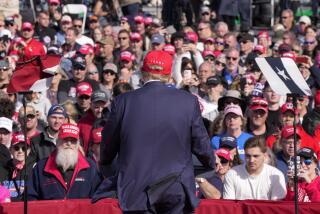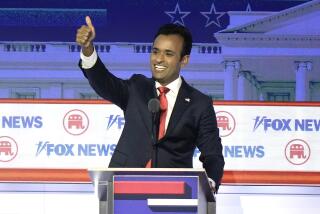A ‘Straight Shooter’ Takes Hits
- Share via
WASHINGTON — Shifting stories and new revelations concerning the administration’s prewar allegations about Iraq’s nuclear program are creating the most serious challenge to President Bush’s credibility since he took office -- and perhaps since he entered politics.
Throughout his career, Bush’s reputation as a plain-spoken “straight shooter” has been central to his political appeal. But Bush and his aides have provided an opening for Democrats to assail that reputation through tangled efforts to explain why his State of the Union address in January contained an accusation that Iraq had attempted to purchase uranium in Africa -- a charge the administration now says it cannot prove and should not have included in the speech.
From both Capitol Hill and the campaign trail, Democrats are questioning the administration’s veracity more aggressively than at any point in Bush’s term -- using incendiary language like “credibility gap” and “cover-up” that attempt to link Bush to other presidents who lost the nation’s trust, such as Lyndon B. Johnson and Richard Nixon.
“This administration has displayed a disregard for the truth while engaging in a pattern of deception, running from the war in Iraq to the state of the nation’s economy, its environment and its schools,” Democratic presidential contender Howard Dean charged Friday in Des Moines.
Ed Gillespie, who was elected chairman of the Republican National Committee in New York City on Friday, provided the GOP response to the growing criticism from Democrats in his acceptance speech. “Their overheated rhetoric toward the president, bandying about words like ‘lying,’ ‘madman’ and, yes, ‘impeachment,’ is designed to distract from the central fact that their policies would not make us safer in the world, and President Bush’s do,” he said.
Polls don’t suggest that Bush is yet facing public doubts about his honesty nearly as pervasive as confronted Johnson, Nixon or Bill Clinton. But some recent surveys indicate growing skepticism about the reliability of Bush’s word, particularly in the case he made for war in Iraq.
“This is the roughest patch Bush has faced in terms of his credibility,” said Bruce Buchanan, a political scientist at the University of Texas. “He has lost his virginity on this issue now, regardless of what happens.... He will never be quite back to that squeaky-clean, straight-shooting paragon of integrity he could claim before this.”
Bush, evoking archetypes of the old West, has long cultivated an image as a man who doesn’t say much but means deeply what he says. In his victory over Al Gore in 2000, Bush played off the doubts many voters held about the veracity of the then-vice president and Clinton. “I will repair the broken bonds of trust between Americans and their government,” Bush declared.
The perception of honesty has been vital to Bush’s appeal, said Buchanan. “He doesn’t bring the rhetorical polish that others do. So what he brings to the table is precisely that straight-shooter authenticity and integrity.”
But over the last three weeks, Bush and his aides have found themselves in a bog of fluctuating explanations and proliferating questions about the inclusion in the State of the Union of what White House officials often deride as just 16 words: “The British government has learned that Saddam Hussein recently sought significant quantities of uranium from Africa.”
On July 7, then-White House Press Secretary Ari Fleischer said the president should not have included the claim in the speech because the charge was based in part on forged documents alleging that Iraq had tried to obtain uranium in Niger. The concession came a day after former diplomat Joseph C. Wilson IV revealed he had told the administration that he concluded the claim was untrue when the CIA sent him to investigate in 2002.
Since then, the administration has at various points suggested that the allegation may still be true (by noting that the British government stands behind it), argued that it was inconsequential to the overall case for war and, most emphatically, blamed the CIA for failing to raise objections to its inclusion in the speech.
But the attempt to shift focus toward the CIA suffered a major blow Tuesday when White House Communications Director Dan Bartlett and deputy national security advisor Stephen Hadley, in an extraordinary on-the-record briefing, were forced to acknowledge that the CIA intervened last October to remove references to the African uranium charge from a speech Bush gave in Cincinnati.
Hadley and Bartlett said the CIA had sent the White House two memos in October clearly indicating doubts about the British claim. About one of the CIA memos, Hadley said: “The memorandum describes some weakness in the evidence, the fact that the effort was not particularly significant to Iraq’s nuclear ambition.”
The remarks from Hadley and Bartlett raised several conflicts with earlier administration statements. Key among them:
* On July 14, Bush told reporters that doubts about the uranium claim only emerged “subsequent to the [State of the Union] speech.” But the Hadley/Bartlett briefing made it clear that the CIA had forcefully questioned the allegation long before the speech. Bartlett said Tuesday that officials never informed Bush about the CIA’s objections in October.
* In television interviews June 8, national security advisor Condoleezza Rice said doubts about the Niger allegation never reached her level prior to the State of the Union speech. But Tuesday’s briefing revealed that three months before the speech, Hadley, her deputy, had received the two memos outlining the intelligence community’s doubts about the claim, and that the second memo had been sent to Rice. It is not known whether she read it.
* At the briefing, Hadley said the claim about Iraqi attempts to purchase uranium in Africa reappeared in the State of the Union address, after being deleted from the Cincinnati speech, essentially because he forgot about the earlier objections and no one from the CIA or other agencies raised them again.
But the Los Angeles Times and other media outlets have reported that in closed-door testimony to the Senate Select Committee on Intelligence earlier this month, Alan Foley, the director of the CIA’s counter-proliferation center, said he expressed doubts to the White House during the vetting process for the State of the Union speech. The White House continues to insist that the CIA raised no objections during that period.
With all of these questions swirling, the Democratic presidential contenders and party leaders on Capitol Hill are dramatically escalating their challenges to Bush’s credibility.
Critics of the war were initially most aggressive in raising the issue. Dean, the former Vermont governor, has applied the old Watergate question, asking, “What did the president know and when did he know it?”
MoveOn.org, an online liberal advocacy group, has generated more than 400,000 letters to Congress demanding an investigation. On Tuesday, it raised $225,000 in five hours for ads accusing Bush of misleading the country before the war.
But even Democrats who supported the war are joining the chorus. Presidential contenders Rep. Richard A. Gephardt of Missouri and Sen. John F. Kerry of Massachusetts have both accused Bush of a “credibility gap” that extends beyond the disputed uranium claim to issues such as the beneficiaries of his tax cut and the impact of his education policies.
In a blistering speech in San Francisco last week, Gephardt charged that “Republicans leveled articles of impeachment” against Clinton “for a far smaller number” of disputed words than the 16 in Bush’s Africa claim.
Polls don’t suggest that these rising questions have significantly undermined public faith in Bush’s integrity -- but they do contain some clear warning signs for him.
For instance, in an early July CNN/Gallup/USA Today survey, 58% of Americans said they did not believe that Bush had deliberately misled the nation about Iraq’s weapons of mass destruction. But the percentage who thought he did deliberately deceive the public rose from 31% in May to 39%, with the sharpest increase coming among independent voters.
More ominously for the White House, in a CNN/Time poll released last week, just 47% described Bush as “a leader you can trust,” while 51% said they had “doubts and reservations.” In March, 56% said they trusted Bush, while just 41% doubted him.
Andy Kohut, director of the nonpartisan Pew Research Center for the People & the Press, said he believes Bush should be able to contain the damage so long as no proof emerges that he personally knew the Africa allegation was false before he uttered it.
Republicans generally believe that Democrats risk looking weak on the war itself if they press too far in their claim that Bush misled the nation as he made the case for it.
“Let them come,” said one senior Republican familiar with White House thinking.
But Democratic pollster Geoff Garin said Bush still faces the danger that the flap over the uranium claim will cause voters to see him as a more conventional politician after largely viewing him in a different light following the Sept. 11 attacks.
“What’s at risk for Bush here is this feeling that he is a leader Americans can trust,” Garin said.
More to Read
Get the L.A. Times Politics newsletter
Deeply reported insights into legislation, politics and policy from Sacramento, Washington and beyond. In your inbox twice per week.
You may occasionally receive promotional content from the Los Angeles Times.










